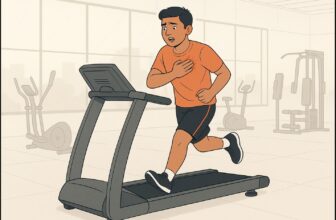In India, sticking to an ideal diet plan is often difficult. Festivals, family gatherings, and the convenience of high-carb street foods like samosas, parathas, and sweets make it easy to slip.
Yet, cycling can still help you lose fat more effectively than many realize. It is one of the few forms of exercise that continues burning fat even when you are not training like a professional or eating like a nutritionist.
Here’s how cycling triggers fat loss, even if your diet isn’t always ideal.
1. Cycling Activates Steady-State Fat Burning (Zone 2 Training)
Cycling naturally places you into a moderate heart rate zone (known as Zone 2, around 60-70% of your maximum heart rate).
Research from the Journal of Sports Sciences shows that exercising in Zone 2 uses fat as the primary energy source, rather than carbohydrates.
- When you ride at a steady pace, your body taps into stored fat more consistently.
- Even 45 minutes of slow, steady cycling can maximize fat oxidation, especially when done regularly.
In Indian conditions, casual rides in parks, open roads, or along quiet village paths easily fit into this fat-burning zone. Source
2. Helps You Stay in Caloric Deficit Without Overtraining
Cycling can burn anywhere from 300 to 600 calories per hour depending on your speed, terrain, and body weight (Harvard Health Publishing data).
Even if you have an imperfect diet with some extra calories, regular cycling helps tilt your overall week into a slight caloric deficit.
Unlike high-impact exercises like running, cycling is low-impact on joints, making it easier to sustain daily rides without injury.
- For example, a 70 kg person riding moderately for 45 minutes burns about 400 calories.
- Cycling 5 times a week equals around 2,000 calories burned roughly equivalent to skipping 3-4 heavy Indian meals.
3. Improves Insulin Sensitivity (Even if You Eat Carbs)
A major reason body fat accumulates is poor insulin sensitivity when your body doesn’t process carbohydrates well. Cycling improves insulin sensitivity by activating large muscle groups (quads, hamstrings, glutes), leading to better glucose uptake into muscles instead of storing it as fat.
- A 2017 study in Diabetologia showed that even moderate cycling improved insulin sensitivity within two weeks in adults with poor diets.
- In India, where carb-heavy foods dominate, improving insulin sensitivity through cycling can dramatically slow down fat gain.
4. Increases Your Non-Exercise Activity Thermogenesis (NEAT)
NEAT is the energy you burn during all activities outside structured exercise walking to shops, moving around the house, commuting.
Cycling boosts NEAT because:
- You are more likely to bike short distances instead of sitting in a car or bus.
- A short 10-minute cycling commute burns about 50-70 calories small but significant over weeks.
For many Indians in cities like Bengaluru, Pune, and Chandigarh, casual cycling for errands can contribute meaningfully to weekly fat burn without extra effort. Source
5. Taps Into Belly Fat Specifically During Longer Rides
Scientific reviews (e.g., Obesity Reviews Journal) have found that long-duration, moderate-intensity cardio like cycling preferentially mobilizes visceral fat the deep belly fat linked to diabetes, hypertension, and heart disease.
- A weekend 90-minute easy ride can be more effective at shrinking waist size than a short, intense gym session.
- Even if your weekday meals are inconsistent, long rides help chip away at stubborn belly fat.
This is highly practical for Indian workers who can cycle casually on weekends when schedules are freer.
6. Boosts Mitochondrial Density and Fat-Burning Enzymes
Cycling enhances the number and function of mitochondria (your body’s “fat-burning engines”) inside muscles.
- According to studies in The Journal of Applied Physiology, endurance activities like cycling increase levels of enzymes like CPT-1 and citrate synthase that speed up fat metabolism.
- This biological change means even when resting or eating an imperfect diet you will burn more fat over time compared to non-cyclists.
7. Increases Appetite Control Hormones
After moderate cycling, studies show a rise in hormones like GLP-1 (Glucagon-like peptide 1), which:
- Reduces hunger.
- Improves feelings of fullness after meals.
- Controls post-meal blood sugar spikes.
In a country like India where portions can be large and meals carb-heavy (think rice plates, thalis, biryanis), better appetite regulation from regular cycling prevents chronic overeating even if your food quality isn’t always ideal.
8. Reduces Stress-Induced Fat Storage (Cortisol Control)
Stress triggers cortisol release, which promotes fat storage particularly around the belly.
Cycling outdoors acts as a natural stress buster, significantly lowering cortisol levels.
- A study from Environmental Health and Preventive Medicine found that cycling in nature (“green exercise”) reduced cortisol by up to 15% compared to indoor workouts.
- Cycling along lakes, parks, or green areas in India (like Lodhi Gardens in Delhi or Cubbon Park in Bangalore) combines fat burning with mental relaxation.
Even short morning or evening rides help break the cycle of stress-eating and fat accumulation.
Summary – Consistency Beats Perfection
| How Cycling Helps | Key Benefit | Indian Relevance |
|---|---|---|
| Steady-State Fat Burning | Uses fat as primary fuel | Casual rides easily achieve this |
| Caloric Deficit | Burns 300-600 calories/hour | Balances extra food intake |
| Improved Insulin Sensitivity | Better carb metabolism | Important for high-carb Indian diets |
| Higher NEAT | Burns extra calories daily | Good for commutes and errands |
| Belly Fat Targeting | Shrinks visceral fat | Weekend rides effective |
| More Mitochondria | Faster fat oxidation at rest | Long-term fat-burning benefit |
| Better Appetite Control | Lowers hunger hormones | Prevents overeating typical large Indian meals |
| Cortisol Reduction | Reduces stress fat gain | Green spaces accessible for cycling |
In real life, few people especially in India eat a textbook “perfect” diet every day. Even if your diet includes the occasional plate of pav bhaji, dosa, or gulab jamun, regular cycling helps your body stay in fat-burning mode, preserve metabolic health, and prevent long-term fat accumulation.
You do not need fancy gear or expensive gym memberships. A basic, comfortable cycle, 30-45 minutes of riding 4-5 times a week, and a bit of patience can dramatically improve your fat loss journey even when life (and diet) aren’t perfect.





